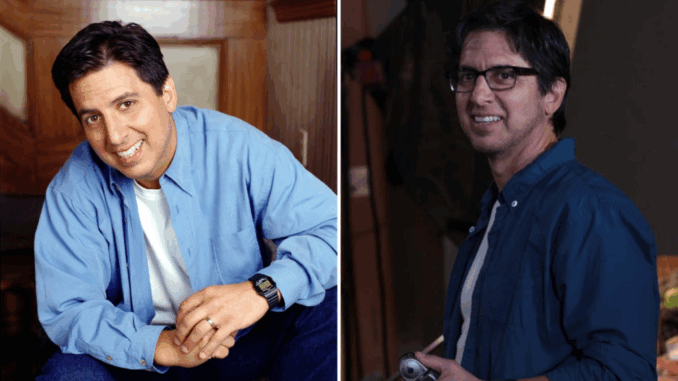
Ray Romano didn’t burst onto the scene with Hollywood glitz or overnight fame. In fact, his journey from a struggling stand-up comic in New York to the star of one of television’s most iconic family sitcoms was anything but smooth.
He wasn’t flashy. He wasn’t loud. He was just… relatable. And maybe that’s exactly why America fell in love with him.
This article explores Ray Romano’s path from the comedy trenches to becoming a household name and emotional anchor of American sitcom culture.
The Early Years: Comedy Roots in Queens
Born in Queens, New York in 1957, Ray Romano grew up in a typical working-class family. His dad was a real estate agent and engineer; his mom, a piano teacher.
Romano didn’t grow up dreaming of stardom. He studied accounting, believe it or not. But while crunching numbers, he realized his real talent was making people laugh.
Bombing, Rejections, and Finding His Voice
Before fame, Romano struggled on the comedy circuit. He bombed at open mics, lost auditions, and often felt invisible in the competitive New York comedy scene. He even got cut from Star Search early on.
But instead of quitting, he doubled down. He honed a style that wasn’t built on punchlines—but on stories. Relatable stories about family, marriage, awkwardness, and everyday frustrations.
The Big Break: Letterman Changes Everything
In 1995, Romano got a life-changing slot on The Late Show with David Letterman. That performance caught the attention of Letterman’s production company, which saw potential in Ray’s dry humor and everyman charm.
They pitched a sitcom tailored to his voice—and “Everybody Loves Raymond” was born.
Everybody Loves Raymond: A Slice of Real Life
Premiering in 1996, the show wasn’t flashy. No exotic locations. No outlandish characters. Just Ray, his wife Debra, their kids, and his hilariously overbearing parents and brother.
And that’s what made it magic.
The series ran for 9 seasons, became one of CBS’s biggest hits, and earned multiple Emmys. It was grounded, hilarious, and surprisingly heartfelt.
Why Everyone Related to Ray
Romano played himself—literally. Much of the show was inspired by his real life. His wife’s name? Debra. His kids? Twins, just like the show. His actual family quirks were written into episodes.
This transparency made him the ultimate “TV everyman.” People saw their own families in the Barones.
Ray Romano’s Unique Comedy Style
Ray isn’t loud. He doesn’t do impressions. His comedy is subtle, observational, and deeply human. It’s the kind of humor that creeps up on you because it’s so honest.
He turns life’s smallest annoyances—like fighting over thermostat settings or parenting fails—into gold.
After Raymond: A Quiet But Impressive Career Shift
After the sitcom ended, many expected Romano to fade. But he didn’t.
Instead, he leaned into character-driven work. He voiced Manny the mammoth in the Ice Age franchise, showing his ability to charm younger audiences.
He also surprised critics with dramatic roles in shows like Parenthood and Get Shorty, and movies like The Irishman and The Big Sick—where he stole scenes with emotional depth and quiet presence.
Romano the Writer and Producer
Romano isn’t just an actor—he’s a creator. He co-created the short-lived but critically praised Men of a Certain Age, which focused on middle-aged men facing life’s second act.
It was personal. It was funny. And it showed Romano was more than just a sitcom guy.
Real Life Ray: Still Humble, Still Married
While many Hollywood stars spiral, Ray Romano remains grounded. He’s still married to his wife Anna—his college sweetheart. They’ve been together for decades, and he often credits her for keeping him sane.
He’s the rare celebrity who doesn’t court attention, fame, or controversy.
Romano and the Value of Clean Comedy
Ray helped prove you didn’t have to be edgy or raunchy to be hilarious. His style was always clean, clever, and deeply relatable—something that made his comedy more accessible to wide audiences.
In a world of loud voices, Romano’s subtlety stood out.
Why He Still Matters in 2025
Even today, Ray Romano is quietly one of the most respected figures in American entertainment. He’s proof that staying true to yourself, telling honest stories, and not chasing trends can still build an enduring career.
He’s no longer just “that guy from that show”—he’s a blueprint for longevity.
Legacy: A Voice of Middle-Class America
Romano’s appeal lies in his authenticity. Whether he’s talking about marital miscommunications or the awkwardness of parenting teens, there’s always a sense of “I’ve been there” in his delivery.
He doesn’t just play the everyman—he is the everyman. And that’s why his work has stood the test of time.
Conclusion: Ray Romano—The Quiet Icon We All Grew Up With
Ray Romano didn’t seek the spotlight, but it found him anyway. Through talent, humility, and genuine storytelling, he earned his place in American hearts. From comedy clubs to primetime TV and beyond, his journey is one of quiet triumph—and one that’s still going strong.
We may not shout his name every day, but one thing’s for sure: Everybody still loves Ray.
FAQs
1. What was Ray Romano doing before “Everybody Loves Raymond”?
He was a struggling stand-up comic performing in clubs across New York and had a brief appearance on Star Search and Letterman before landing his sitcom.
2. How much of “Everybody Loves Raymond” was based on Ray’s real life?
A lot! His wife’s name is Debra, he has twins, and many storylines were inspired by his real family experiences.
3. Did Ray Romano have any dramatic roles?
Yes, he’s had critically praised performances in The Big Sick, The Irishman, Parenthood, and more.
4. Is Ray Romano still active in entertainment?
Absolutely. He continues acting, writing, and even directing, most recently stepping behind the camera in indie projects.
5. What makes Ray Romano’s comedy style unique?
His comedy is clean, subtle, and observational—focusing on real-life awkwardness and everyday situations most people can relate to.
